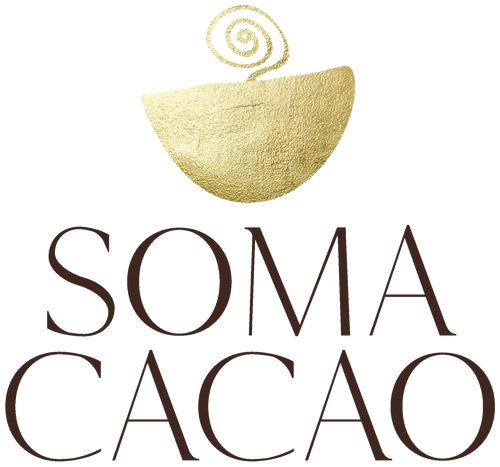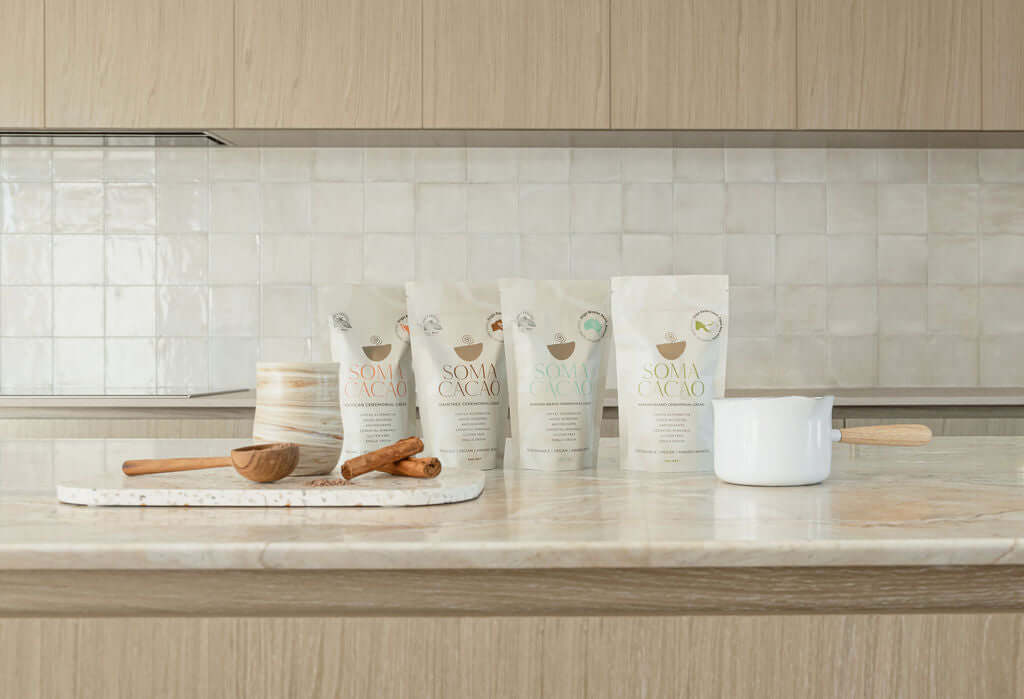5 Reasons to Switch at Least One Cup of Coffee for Soma Cacao in 2024

In my twenties, I was an avid coffee enthusiast, famously known for my overly specific coffee order—a strong, extra-hot soy latte with a hint of honey, 3/4 full. My days in Sydney revolved around coffee breaks, each sip providing a familiar jolt of energy. However, my relationship with coffee changed during my travels in Nicaragua, where I was introduced to cacao as a coffee alternative. Initially skeptical, I quickly became amazed by how cacao made me feel—alive, open, and free.
Relocating to Mexico, where cacao is a part of daily life, I embraced this plant-based, nutrient-dense food and effortlessly replaced coffee with cacao. What surprised me the most was how easy the transition was after a decade of hardcore coffee consumption. While coffee left me feeling jittery and anxious, cacao offered a calm, steady energy that felt nourishing, not depleting.
This shift wasn’t planned; it just felt right. Cacao provided a balanced, pleasant energy source, while coffee became increasingly associated with a wired, anxious state. My growing awareness through meditation and yoga made it clear—cacao supported my mental and emotional wellbeing in ways coffee never could. Here are the top five reasons why I believe we should all consider swapping at least one cup of coffee a day for the grounding embrace of cacao.
1. Cacao Reduces Stress, Whereas Coffee Amplifies It
Coffee, particularly its caffeine content, increases epinephrine (adrenaline) levels in the bloodstream, triggering the body's fight-or-flight response. This response is meant to help us respond to immediate threats, but in modern life, many of us stay in this high-alert mode almost constantly, leading to chronic stress. Practices like yoga and meditation aim to activate the parasympathetic nervous system—the "rest and digest" mode that helps our bodies relax, digest food properly, and recover from stress. Unfortunately, coffee works against this effort, keeping us stuck in a heightened state of alertness【Lovallo, 2005】.
Caffeine also stimulates the release of cortisol, the stress hormone, which increases alertness but also raises blood sugar, heightens anxiety, and can lead to cognitive impairment if overproduced. Chronic cortisol exposure weakens the immune system and has been linked to anxiety, sleep disturbances, and even cardiovascular problems【Bjorvatn et al., 2020】.
Cacao, on the other hand, contains theobromine, a much gentler stimulant. Theobromine relaxes blood vessels, reducing blood pressure without the jittery side effects of caffeine. Cacao is also rich in magnesium, a mineral that reduces stress and helps the body relax. Regular consumption of cacao can lower cortisol levels and promote a sense of calm, making it a much more supportive choice for stress relief【Fraga et al., 2011】.
2. Cacao Improves Cardiovascular Health, While Coffee May Harm It
Cacao contains flavanols, powerful antioxidants that improve cardiovascular function by reducing blood pressure and enhancing blood flow to the brain and heart. These flavanols help prevent blood clots and reduce arterial stiffness, which lowers the risk of hypertension, stroke, and heart disease【Monahan et al., 2011】.
One of the most famous examples of cacao’s heart-healthy benefits comes from the Kuna Indians, who live off the coast of Panama. The Kuna consume large amounts of cacao daily, and studies show that they have much lower rates of heart disease, lower blood pressure, and fewer cardiovascular events than neighboring populations. Cacao has been linked to improved arterial function and may reduce the risk of heart attack or stroke【Hollenberg et al., 2006】.
In contrast, caffeine from coffee can elevate systolic blood pressure, especially in people who are not regular coffee drinkers. It also increases heart contraction intensity, potentially leading to palpitations or irregular heartbeats【Lovallo, 2005】. Coffee consumption, particularly in large amounts, has been linked to cardiovascular problems, making it a riskier option compared to cacao for those with heart concerns.
3. Cacao Doesn’t Come with Negative Side Effects Like Coffee Does
The side effects of caffeine are well-documented—restlessness, jitters, insomnia, and an increased heart rate are just a few. Coffee has also been linked to reduced sleep quality and increased anxiety, particularly in people sensitive to caffeine. Consuming more than four cups of coffee per day can lead to gastrointestinal issues, nausea, and even an increased risk of fertility issues in women【Vitti, 2020】.
Cacao, however, is virtually free from these negative side effects. Instead of disrupting sleep or inducing anxiety, cacao supports relaxation and well-being. Its combination of PEA (phenylethylamine) and anandamide (often called the “bliss molecule”) promotes feelings of happiness and relaxation. While cacao does contain small amounts of caffeine, it’s much less (about 3-5 times less than coffee), and it doesn’t lead to the same overstimulation that coffee often does.
4. Cacao Is a Nutritional Powerhouse, While Coffee Is Nutrient-Poor
One of the biggest differences between cacao and coffee is their nutritional content. While coffee contains little to no vitamins or minerals, cacao is one of the most nutrient-dense foods on the planet. Here's a breakdown of how much more nutrient-dense cacao is compared to coffee:
- Iron: Cacao contains 80100% more iron than coffee
- Calcium: Cacao contains 2700% more calcium
- Potassium: Cacao contains 1040.8% more potassium
- Magnesium: Cacao contains 4766.7% more magnesium
- Zinc: Cacao contains 9950% more zinc
- Phosphorus: Cacao contains 6766.7% more phosphorus【USDA, 2020】.
With each cup of cacao, you’re not only getting a gentle energy boost, but also providing your body with essential minerals that support your heart, muscles, brain, and immune system. Coffee simply can’t compete on the nutrition front.
5. Cacao Contains Essential Vitamins That Coffee Lacks
In addition to minerals, cacao is also a rich source of essential vitamins, including Vitamin E, Vitamin B1, Vitamin B3, and Vitamin B6. These vitamins play critical roles in energy production, immune function, and maintaining healthy skin and brain function. Coffee, by comparison, provides none of these vitamins apart from Vitamin B2, in which it has a slight edge【USDA, 2020】.
Our Stance
Cacao offers a gentler, longer-lasting, and more pleasant energy source compared to coffee, along with a plethora of nutritional benefits. Coffee, while enjoyable in moderation, increases anxiety, triggers the fight-or-flight response, and offers little in the way of nutrients. While we’re not suggesting you remove coffee from your routine entirely (it does have some benefits, like lowering the risk of Parkinson’s disease and Type 2 diabetes), we recommend switching out at least one cup of coffee for cacao. Your body, mind, and heart will thank you.
Ready to make the switch? Try our sampler pack and explore our award-winning cacao varieties!
References
- Bjorvatn, B., Sagen, I. M., & Pallesen, S. (2020). Caffeine and its effects on sleep. Sleep Medicine Reviews, 53, 101319.
- Fraga, C. G., Litterio, M. C., Prince, P. D., Calabró, V., Piñeiro, A., & Galleano, M. (2011). Cocoa flavanols: Effects on vascular nitric oxide and blood pressure. Journal of Clinical Biochemistry and Nutrition, 48(1), 63-67.
- Hollenberg, N. K., & Martinez, G. (2006). Aging, cocoa, and blood pressure: The Kuna case. Hypertension, 48(5), 790-795.
- Lovallo, W. R. (2005). The effects of caffeine on human health. Food and Chemical Toxicology, 43(5), 631-641.
- Monahan, K. D., Feehan, R. P., Kunselman, A. R., Preston, A. G., & Miller, D. L. (2011). Dose-dependent increases in flow-mediated dilation following acute cocoa ingestion in healthy older adults. Journal of Applied Physiology, 111(6), 1568-1574.
- USDA FoodData Central. (2020). Nutrient Database for Standard Reference.
- Tags: Cacao Hacks Health Opinion


































